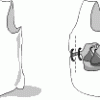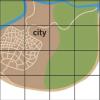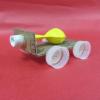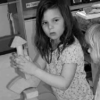Search Results
Showing results 1261 to 1280 of 1617

3D-tection: Trying to Fit In
Source Institutions
In this activity, learners explore how molecules must fit together, like a lock and key, in order to identify each other and initiate a new function as a combined unit.

The Jelly Bean Problem (JBP)
Source Institutions
In this activity, learners are challenged to eat some candy as a cell would need to as well as to think about some of the problems that arise when a cell ingests food.

Restriction Enzyme Digestion: How does it work? Why is it useful?
Source Institutions
In this activity related to plant biotechnology, learners use restriction enzymes to cut up DNA from a virus called Bacteriophage λ, a process known as restriction digestion.

Puzzled Partners
Source Institutions
In this web-based activity, learners try to figure out who in an online chat room has their matching puzzle piece.

If Anyone Can, Icon
Source Institutions
In this activity, learners create their own icons for a forecast-at-a-glance poster for their classroom/learning space.

Scientific Measurement Exercise
Source Institutions
Learners measure irregularly shaped bones using a variety of measurement methods and tools. Then, they measure again using standard conventions and metric tape measures.
Making Rivers
Source Institutions
In this outdoor water activity, learners explore how to change the direction of water flow. Learners make puddles in dirt or use existing puddles and sticks to make water flow.

Conservation Island
Source Institutions
In this lesson, learners will understand the concepts behind endangered and extinct animals and develop their own conservation plan to save three endangered species.

Engineering Ups and Downs
Source Institutions
In this activity, learners explore the engineering and principles behind working elevators.

Mission: Control!
Source Institutions
In this activity and game, learners will train to improve balance and spatial awareness by performing throwing and catching techniques on one foot.
Energy Audit
Source Institutions
In this lesson, learners will practice graphing and statistically analyzing data.

Hot Stuff!
Source Institutions
In this activity, learners discover that sand is the major ingredient in glass.

Popsicle Bridge
Source Institutions
In this activity, learners explore how engineering has impacted the development of bridges over time, including innovative designs and the challenge of creating bridges that become landmarks for a cit

Balloon Car
Source Institutions
In this activity, learners explore force and motion by constructing cardboard cars that are propelled by balloons.

Slide Whistle
Source Institutions
In this activity, learners build a slide whistle using PVC pipe, bamboo skewer, and piece of foam. Construction of the instrument is relatively simple.

Tourist Town: Dominating Sets
Source Institutions
In this activity, learners use a fictitious map of "Tourist Town" and counters to problem solve how to place ice-cream vans on street intersections so that every other intersection is connected to one
Tree Poker
Source Institutions
In this activity (p.14-15 of PDF), learners discover the concepts of competition and limiting factors as they relate to plant and animal communities.

Building Tall
Source Institutions
In this engineering activity (page 2 of PDF), young learners investigate how a wide base can make a building more stable. Learners use blocks or boxes of different sizes to construct stable towers.

The Turing Test: Conversations with Computers
Source Institutions
This activity aims to stimulate discussion on the question of whether computers can exhibit “intelligence,” or are ever likely to do so in the future.

Exploring Fabrication: Self-Assembly
Source Institutions
In this activity, learners participate in several full-body interactive games to model the process of self-assembly in nature and nanotechnology.
